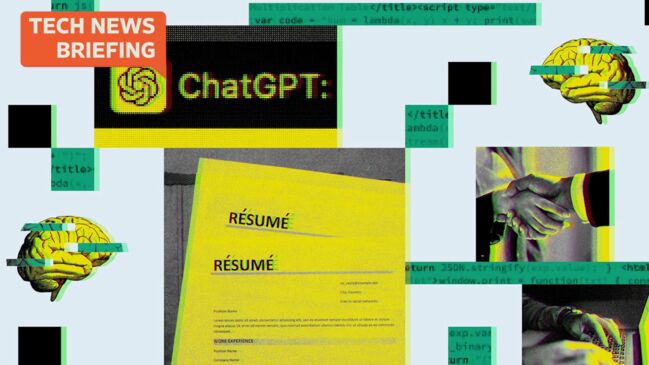What to consider when using ChatGPT to apply for jobs
Increasing numbers of jobseekers are using ChatGPT to apply for positions. Here’s what to consider when enlisting AI to help you find work.

Careers
Don't miss out on the headlines from Careers. Followed categories will be added to My News.
Australians who rely an online bot to write resumes may get overlooked for roles, experts warn, as increasing numbers of jobseekers apply for positions using ChatGPT.
Career expert Athena Ali, from The Get Noticed Coach, fears artificial intelligence tools are producing “hyped-up” resumes that bear little resemblance to candidates, who risk becoming unstuck during job interviews.
“The issue I have with it is when (candidates) get to the interview and they present nothing like their resume,” she says.
“How are you going to get through the psychometric testing and what are you going to say during the interview?
“The human element is quite different to AI – we haven’t got to a point where AI literally speaks and breathes like we do.
“I’m not opposed to using the technology. But it does need to be authentic to you and represent you and what you might say if you go to an interview … because imposter syndrome will come up at some point.”

Pros and cons
Research from ResumeBuilder.com reveals 46 per cent of job seekers are using ChatGPT to write their resumes and cover letters, motivated by the time they save by using the AI tool.
While almost four in five ChatGPT users report getting through to the interview stage, and almost 60 per cent are subsequently hired. But 11 per cent say they were refused a role after the interviewer discovered they used a bot during the application process.
Ali says those using ChatGPT to produce a resume must ensure they provide it with the correct information and that it matches what is listed in the role’s selection criteria.
She then advises candidates to edit the resulting document to ensure it is personalised and conveys the right tone.
Wherever possible, candidates should limit the use of online bots to cover letters, which typically contain more persuasive language than a resume, Ali says.
“If you’re stuck writing something, (AI) can certainly spark the ideas for you and I think that’s where its value is right now,” she says.
“But even with a cover letter, you would still need to rejig it to sound like you so you will probably find you are doing more work (through having to alter the ChatGPT result), not less.”
Adding personality
Injecting personality into an AI-produced resume and cover letter is essential to getting a good result, says Brian Donn, managing director of software company Ceridian.
He says relying exclusively on bots to apply for roles is lazy and demonstrates a lack of effort “that will count against you”.
“Don’t do it (use AI) 100 per cent,” Donn says. “Take the time to write (a resume) on your own and then put that into AI so you can find improvements and spot minor things that you might not have noticed on your own.
“That way, it can add value but you are still adding your own personality to it.”

Quality control
Mauli Fernando, 23, works for a medical device company and occasionally uses ChatGPT to help compose emails.
He’s open to using AI to write resumes and cover letters, believing it would result in a better document than he could produce on his own.
“Writing a cover letter is quite an arduous process, especially if you are applying for multiple jobs,” he says.
“The quality gets lowered each time, and the letter you send for your 10th job is nowhere near as good as your first one.
“ChatGPT would probably help to make sure that everything was in order and that the cover letter read like a genuine cover letter and that it didn’t have any spelling errors or mistakes.
“But it still just gets you past that first step (to the interview) – you’ve still got to get past the interview step to get the job.”
AI in recruitment
• 46 per cent of job seekers use ChatGPT to write their resumes and/or cover letters
• 7 in 10 job seekers that use ChatGPT report a higher response rate from companies
• 78 per cent of job seekers get an interview when they use application materials written by ChatGPT
• 59 per cent of job seekers are hired after applying to a job using materials written by ChatGPT
• 11 per cent of job seekers were denied a job when the interviewer discovered they used ChatGPT.
Source: ResumeBuilder.com
Originally published as What to consider when using ChatGPT to apply for jobs


